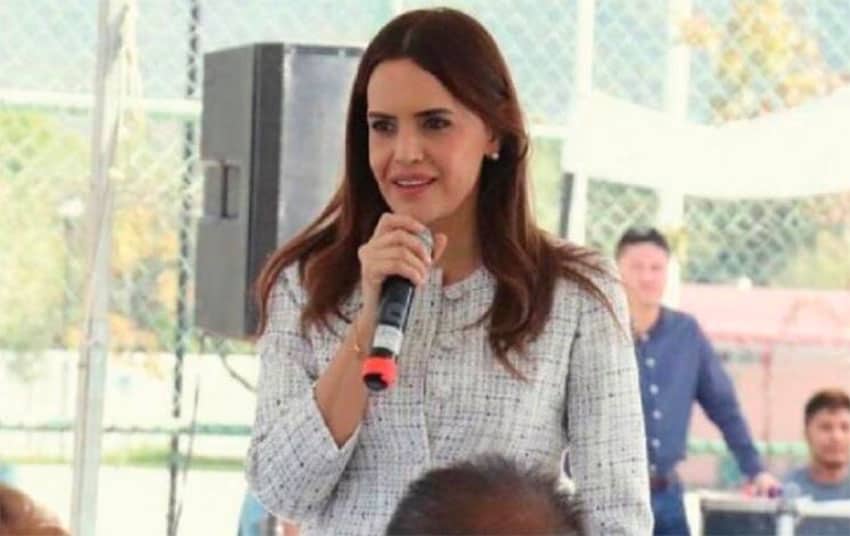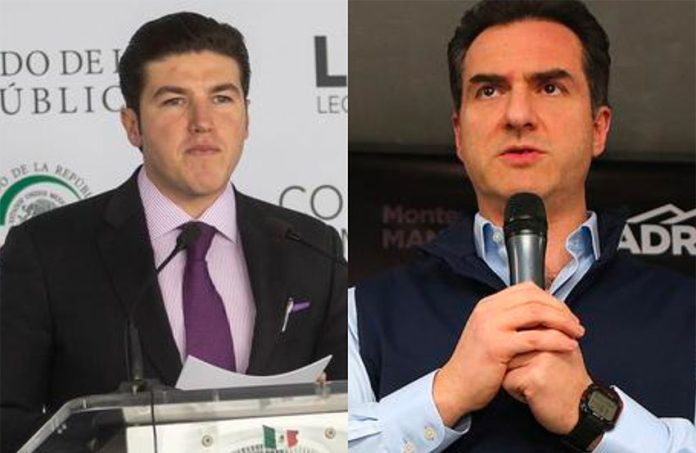With less than four weeks remaining before the June 6 elections, the federal Attorney General’s Office (FGR) announced Monday it is investigating the two leading candidates for governor in Nuevo León for electoral crimes.
The FGR said in a statement issued Monday night that it had received complaints against Institutional Revolutionary Party (PRI)-Democratic Revolution Party (PRD) candidate Adrián de la Garza for using social programs for political purposes – effectively vote buying – and against Citizens Movement (MC) party candidate Samuel García for receiving resources of “illicit origin” and using them for electoral gain.
The case against de la Garza, who is second in most polls behind García, is related to asking for women’s votes in exchange for a so-called “pink card,” which they could use to withdraw cash if the PRI-PRD candidate wins the election.
The FGR said that offering the cards to women amounts to vote-buying, a tactic with which the once omnipotent PRI has long been associated. It noted that it has received a “large number of citizens complaints” against de la Garza for “violating article 19 of the constitution, which orders preventative prison for the use of social programs with electoral purposes.”
However, the FGR didn’t say whether it would seek to detain the candidate, a former mayor of Monterrey.
The case against García, a former senator perhaps best known for scolding his wife for “showing too much leg” during an Instagram Live video last August, relates to “allegedly criminal acts” committed by him, his father, his wife and his wife’s father, the FGR said.
The Attorney General’s Office said it has received several complaints, including one from the federal government’s Financial Intelligence Unit, against the candidate and his family members for allegedly committing offenses set out in article 15 of the General Electoral Crimes Law, “which refers to contributions in money or kind, as well as funds or goods of illicit origin, used illegally for electoral purposes.”
The announcement of the investigation into de la Garza comes just days after President López Obrador accused him of vote-buying at two successive press conferences last week, triggering claims that the supposedly autonomous FGR had been ordered to conduct a probe.
“A coincidence or could it be that they follow orders from the National Palace at the Attorney General’s Office?” asked columnist Salvador García Soto in the newspaper El Universal.
He also wrote that if anyone doubted that López Obrador and his government were willing to do anything to maintain and gain power, the FGR’s announcement confirmed that they are. Using the FGR to go after two opposition candidates who are leading the polls is a “subject of scandal” and a “clear political use of a supposedly autonomous institution,” García Soto wrote.
Standing to benefit from the FGR’s probe into the two leading candidates is the aspirant for Morena – Mexico’s ruling party – Clara Luz Flores, who trails both de la Garza and García by a double digit margin, according to a recent Reforma newspaper poll.

De la Garza, who has also faced allegations of links to organized crime, said in a Twitter message Monday night that he is a victim of political persecution for “proposing to protect the women of Nuevo León.”
For his part, García said that the only thing he is guilty of is “shooting up in the polls.”
“I’m convinced that the only reason behind all the complaints, attacks and defamations that have emerged in recent weeks against me and my family is that we’re going to win the governorship of Nuevo León,” he wrote on Twitter.
The MC candidate also said he is willing to collaborate with authorities because “I have nothing to hide – there is no irregularity in my campaign and even less so in my personal and professional life.”
PRI national president Alejandro Moreno claimed that the FGR’s announcement of its investigation into de la Garza is designed as a distraction from last week’s train crash on the Mexico City Metro system that claimed the lives of 26 people.
The Citizens Movement party’s national leader, Clemente Castañeda, called on López Obrador to “keep his hands off the electoral process.”
The governorship of Nuevo León – currently held by Jaime Rodríguez, a 2018 presidential candidate widely known as “El Bronco” – is seen as one of the biggest prizes on offer at the June 6 elections, at which governors will also be elected in 14 other states and the entire lower house of federal Congress will be renewed.
At his regular news conference on Tuesday, López Obrador – Morena’s founder – expressed support for the FGR’s decision to investigate the two candidates in Nuevo León, asserting that “we cannot be accomplices of fraud.”
“… Yesterday the spokespeople of conservatism were throwing their hands up in horror because the Attorney General’s Office opened an investigation against the Nuevo León candidates; I support that decision, I denounced [de la Garza] here, because [buying votes] is an electoral crime,” he said.
Source: El País (sp), Reforma (sp), El Universal (sp), Milenio (sp)
